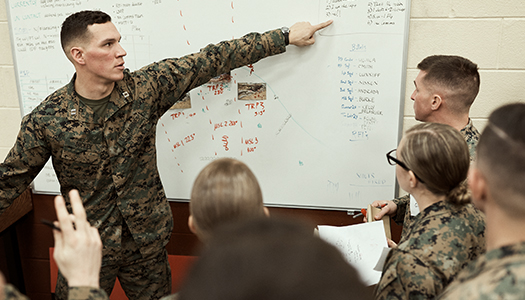- Home
- Career Overview
-
Looking
-
Applying
- College Overview
-
Planning
-
Applying
-
Paying
-
Attending
- Military Overview
-
Joining
-
Serving
These military careers are available to individuals who commission as officers.

Manpower managers determine the structure, composition, position, and equipment requirements of active and reserve military forces. They determine how many and which capabilities are required to execute a mission and they manage allocation of military and civilian resources. These individuals develop and execute programs to accomplish accession planning, classification and utilization, force development, and force shaping programs.
Public Affairs Officers research, plan, budget, execute, and evaluate operations involving the public. They liaise with the news media and provide guidance to senior leaders on decisions that impact mission success. They also collect and present information to internal staff on current operations and matters affecting the military community.
Supply and warehousing managers determine requirements for, and arrangement of, storage facilities. They supervise all warehousing operations from receipt and storage to issue and shipment of materials. They review operational requirements, determine stock availability, and estimate lead time required for procurement and availability of funds.
Transportation managers oversee all procedures related to the movement of military-related personnel and material. They plan and coordinate all functions involved in the successful movement of material, personnel, or personal property via water, air, highway, rail, and multi-modal transport systems. They direct procurement efforts and assess transportation capabilities.
HR managers administer personnel programs by developing and coordinating policies and procedures that support service members. They develop plans for strength accounting and job assignment, performance evaluation and promotions, training, awards, equal opportunity, discipline, and discharge of personnel. They may also assist with programs such as drug and alcohol abuse and control, overseas duty support, family support, recreation, and physical fitness.
Recruiting managers perform and coordinate functions involved in the selection of new recruits into the Military. They are responsible for receiving, orienting, interviewing, and processing applicants for enlistment in the Armed Forces. They liaise with educators and other officials promoting the image of the Military and supporting military personnel procurement.
Healthcare administrators manage military hospitals, clinics, and other healthcare facilities. They oversee the medical and administrative functions of healthcare facilities, and they ensure the readiness of both personnel and equipment to meet the medical needs of service members and their families.
Emergency management officers evaluate potential and actual disasters, ensuring adequacy of warning systems, shelters, and disaster preparedness plans. Emergency management officers prepare and administer measures to cope with both natural disasters and chemical, nuclear weapon, reactor, and radiological incidents. They direct command and control centers during the development of situations and also participate in emergency response operations. These operations may involve responding to accidents.
Environmental health and safety officers direct programs to protect the health and safety of military members and their families. They apply engineering and scientific principles in anticipating, recognizing, and evaluating occupational and environmental health hazards. These officers design and formulate recommendations to preserve and enhance health and environmental conditions to include air, water, noise, liquid and solid waste disposal, food, and institutional hygiene. They also lead hazardous material control, public contingency response, and Chemical, Biological, Radiological & Nuclear safety initiatives.
An important goal of equal opportunity managers is to create an environment free of discrimination and harassment, and address allegations of improper discriminatory conduct. Equal opportunity managers implement EO policies and develop initiatives, such as training, to proactively combat discrimination. They assist in investigations of discrimination and/or sexual harassment and racial incidents. They may also conduct community relations work.